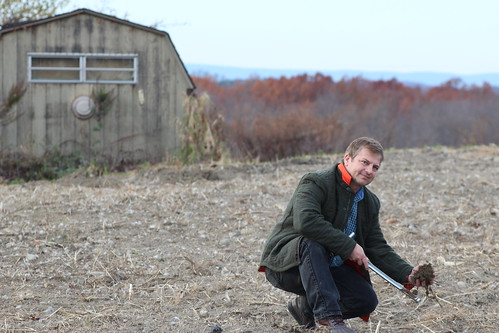
Getting people together to talk can result in great ideas.
In June, USDA hosted 100 farmers, ranchers, retailers and producers in Chester, New York, in the Hudson Valley, to discuss opportunities and challenges in organic production, and to share information on USDA programs and services available to organic producers and processors.
Wholesalers and retailers at the meeting all had a common challenge – keeping up with increasing market demands for organic food. Organic retail sales continue to grow at double-digit rates each year. In 2014, the market reached $39 billion in U.S. sales alone. That level of demand means a lot of opportunities for organic producers, as well as those in the process of transitioning to organic production.
Cathy and Bradley Stroll of Fresh Meadow Farm, certified in the USDA’s Good Agricultural Practices (GAP) and organic standards, discussed their success growing organic produce and selling to a national retail outlet. The Strolls received financial and technical assistance from USDA’s Natural Resources Conservation Service’s (NRCS) Environmental Quality Incentives Program (EQIP) and the Rural Development (RD) Value-Added Producer Grant Program.
USDA also heard directly from producers about common challenges among farmers and processors, such as the need for investments to help small-scale businesses and beginning farmers. Beginning Farmers expressed the need for technical assistance that can be supported through NRCS’ EQIP Organic Initiative. Experienced farmers seeking to scale up their organic operations discussed the USDA Farm Service Agency (FSA) Micro–Loan Program or the Farm Storage Facilities Loan Program.
Since the June event, NRCS and USDA’s Agricultural Marketing Service (AMS) have created new tools and outreach efforts. In October, AMS began rolling out its Sound and Sensible Initiative that has an array of valuable tools and resources, including templates, decision-making tools, training, guides, tip sheets and videos – created through partnerships with 14 agencies. These tools help USDA field staff, organic certifiers and producers make certification for organic production more accessible, attainable and affordable. Also, USDA recently launched its New Farmers website with a new Discovery Tool to make finding resources easier.
At NRCS, we’re also kicking off a new set of outreach efforts for organic producers. One of those is my four-month special assignment to the USDA’s Organic Working Group. My goal is to provide fellow field staff with the information they need to best serve organic and transitioning-to-organic producers. Early next year, I will conduct a number of train-the-trainer workshops in the field so others can pass along this important information.
The more I get to know organic growers and learn how well aligned their practices are with NRCS’ conservation mission, the more enthusiastic I become about helping other farmers and ranchers transition. I’m excited to share this knowledge and to find ways to connect more organic producers with USDA resources.
In the end, I hope that NRCS field staff will have a fuller understanding of how NRCS conservation practices can help farmers and ranchers who are already organic producers or are considering a transition to organic, and inform those producers about the opportunities and resources available through other USDA agencies.
To learn more about USDA assistance for organic producers, visit www.usda.gov/organic, or about NRCS conservation resources that support organic producers, visit www.nrcs.usda.gov/organic.
